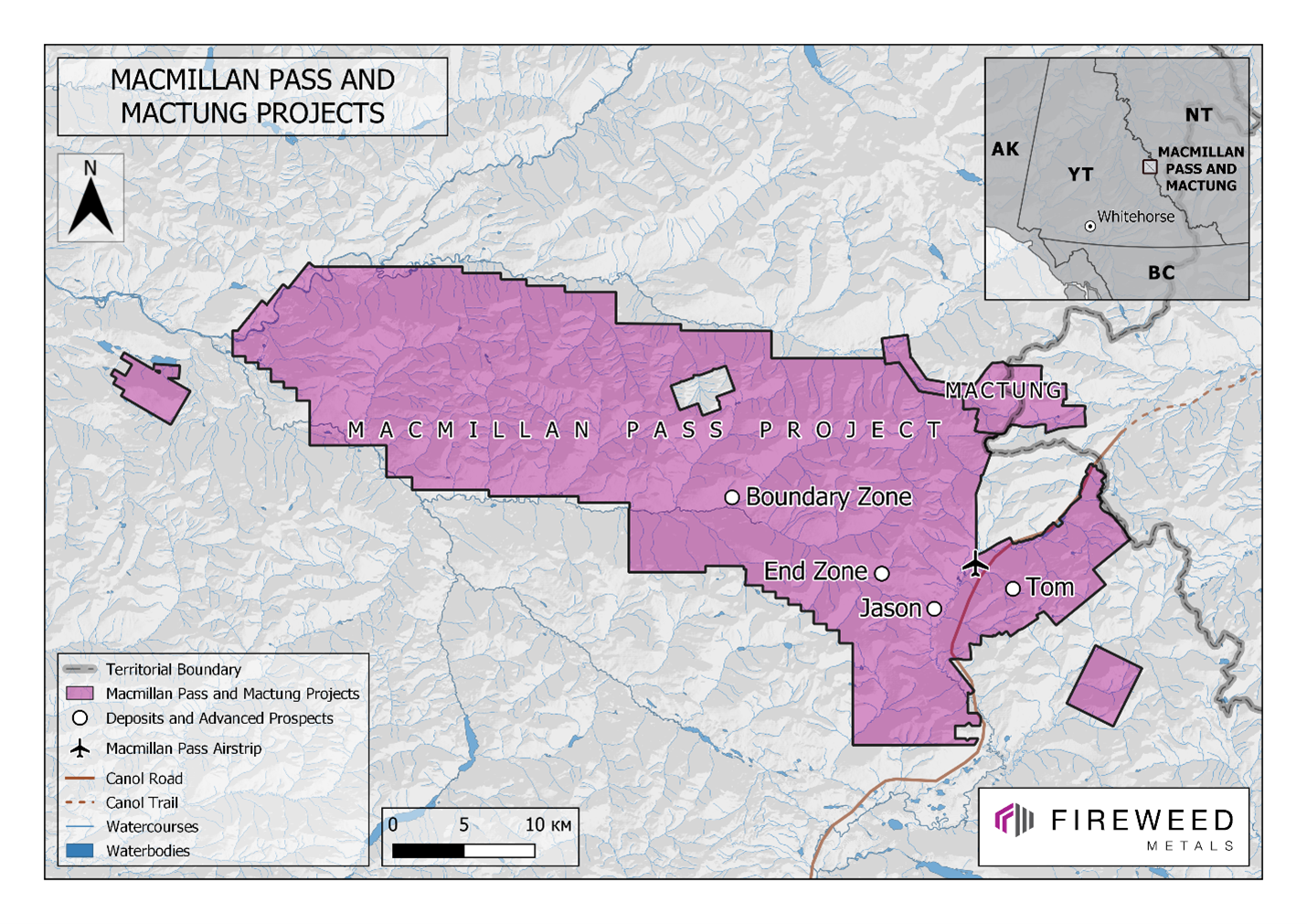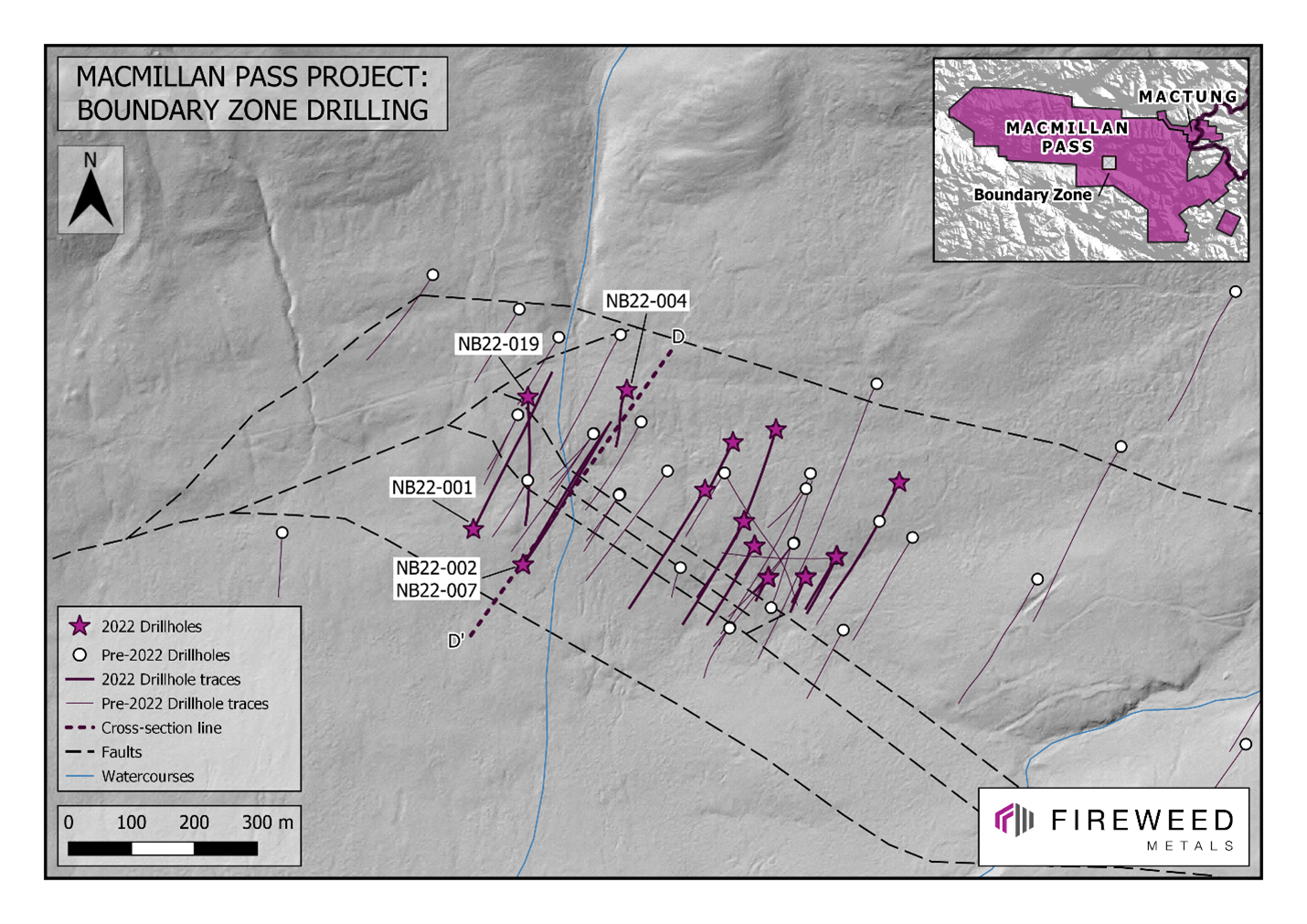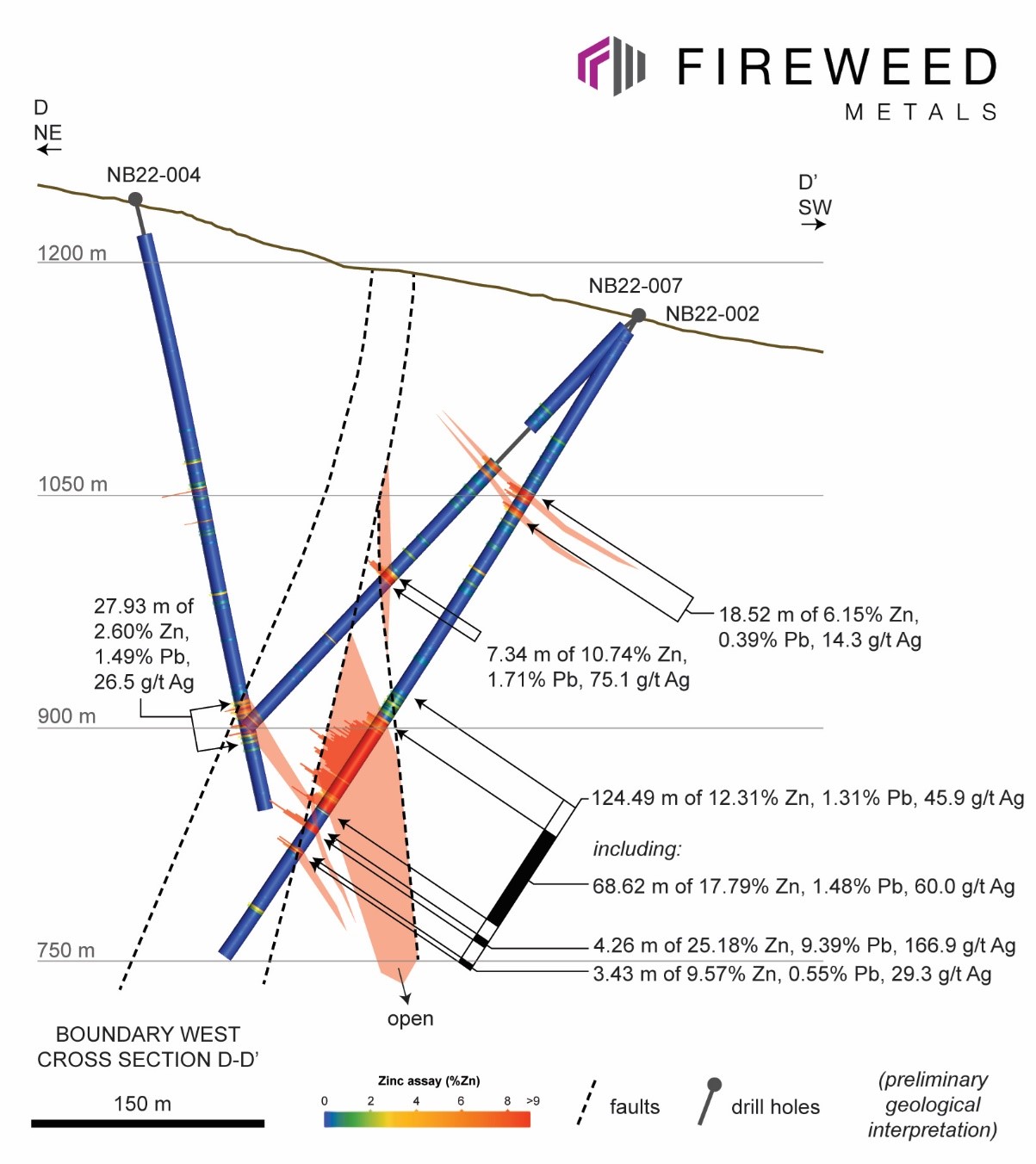Vancouver, British Columbia: FIREWEED METALS CORP. (“Fireweed” or the “Company”) (TSXV: FWZ; OTCQB: FWEDF, formerly Fireweed Zinc Ltd.) is pleased to announce additional results from the 2022 drill program at Boundary West, Macmillan Pass, Yukon, Canada (Map 1).
Highlights
- An infill hole intersected 56.5 m of 6.34% zinc, 0.38% lead, and 36.4 g/t silver within the massive sulphide zone at Boundary West.
- Several step-out holes successfully intersected stratiform mineralization, massive sulphides and Howard Pass style mineralization, extending the mineralization at Boundary West.
- Assay results from 21 holes from Boundary Main and Tom are pending from the 2022 drill program.
- Fireweed is preparing for its largest ever drill program with a cash position of C$38.6M.
CEO Statement
Brandon Macdonald, CEO, stated “These results from the 2022 Boundary West drilling program include several significant step-outs and demonstrate that the massive sulphide zone carries good grade and continuity. We hit another intersection in the Howard’s Pass style mineralization in older rock units for which we see further potential across the property. Results are pending from many of the 2022 drillholes that intersected wide intervals of intense sphalerite-galena mineralization at Boundary Main and the Tom deposit.”
Boundary West Drilling Results
The following drill results are from three drill holes located at Boundary West (Maps 1 and 2). The results from many other holes from the 2022 drill program are pending, including 12 holes from Boundary Main, 8 holes from Tom West and 1 hole from Tom East.
NB22-004
At depth, this hole intersected a zone of stratiform zinc-lead-silver mineralization over 28 m grading 2.6% zinc, 1.5% lead, and 26.5 g/t silver (Table 1, Cross Section D-D’). Preliminary geological interpretations correlate this layer with the stratiform zinc-lead-silver mineralization previously discovered at Boundary West, representing an approximately 115 m step-out. A thin (0.65 m) intersection of high-grade sphalerite veining returned 28.5% zinc within a sequence of conglomerates, similar in style to Boundary Main (Table 1). This hole was targeting a step-out from the very high grade and wide intersection of massive sulphide in hole NB22-002 (reported in Fireweed News Release dated Nov 22, 2022) but had to be abandoned short of the target due to excessive drillhole deviation and the step-out target remains untested.
NB22-007
This hole intersected 4 m of semi-massive sulphide mineralization grading 5.2% zinc and 11 g/t silver within silicified and siderite-altered lapilli tuffs (Table 1), representing a ~30 m step-out up-dip from the newly discovered zone reported in NB22-002 (Fireweed news release dated Nov 22, 2022). This hole also intersected a zone of massive sulphide over 7.3 m grading 10.7% zinc, 1.7% lead, and 75.1 g/t silver including 3.8 m of 15.5% zinc, 1.8% lead, and 94.9 g/t silver (Table 1, Cross Section D-D’). The massive sulphides are hosted in a sequence of silicified black mudstone and barite that ends abruptly against a fault and are interpreted as a faulted block, representing an incomplete section through the Boundary West massive sulphides, stepping out ~35 m from the same zone in NB21-001.
NB22-019
This hole provided an infill intersection of 56.5 m of 6.3% zinc, 0.4% lead, and 36.4 g/t silver within the massive sulphide zone at Boundary West including two distinct high-grade zones: 11.6 m of 10.9% zinc, 0.3% lead, and 43.5 g/t silver; and 13 m of 9.6% zinc, 0.7% lead and 48.2 g/t silver (Table 1). This hole also provided a step-out of the Howard Pass style mineralization intersecting 15.6 m of 2.6% zinc including two 3.1 m intersections of 5.4% zinc and 4.6% zinc, respectively (Table 1). This is a ~50 m step-out from similar mineralization in NB20-009 (see Fireweed news release dated February 25, 2021).
Most zinc mineralization at Macmillan Pass is hosted in Devonian age rocks, however, in 2020, Fireweed drilled a hole that resulted in the discovery of zinc mineralization hosted in older Ordovician-Silurian rocks and termed this “Howard’s Pass style” mineralization owing to similar age host rocks at the large Howard’s Pass zinc-lead deposits that are located approximately 60 kilometers away from Boundary Zone. This was the first discovery of zinc mineralization in these older rocks at Macmillan Pass. Note the Howard’s Pass deposits are not owned by Fireweed and a comparison of these similar geological settings is for information purposes only and does not imply that similar potential quantities or grades will be delineated at Macmillan Pass. The Howard’s Pass style mineralization at Macmillan Pass is at an early stage of exploration and remains to be tested with additional drilling.
Table 1: NB22-004, NB22-007 and NB22-019 drill results.

*Intersected thicknesses, not true thicknesses, are stated for all intersections in Table 1. Due to the early-stage of drilling, true thicknesses cannot be accurately stated for these holes, but are estimated relative to intersected thickness at 10-40% for NB22-004, and 50-75% for NB22-007 and NB22-019 based on angles of bedding to core axis.Note – an interval of core in NB22-007 from 100.72 m to 131.62 m was not assayed as these core intervals were lost to a windstorm that up-ended several core tables, spilling the core on the ground prior to logging and sampling.
Data verification
The diamond drill core logging and sampling program was carried out under a rigorous quality assurance / quality control program using industry best practices. Drill intersections in this release are HQ3 (split tube) size core (61.1 mm / 2.406 inch diameter) with recoveries typically above 85% unless otherwise noted in the table of results. After drilling, core was cleaned, scanned with a core scanning machine, logged for geology, structure, and geotechnical characteristics, then marked for sampling and photographed on site. The cores for analyses were marked for sampling based on geological intervals with individual samples 2 m or less in length. Drill core was cut lengthwise in half with a core saw; half-core was sent for assays reported in this news release, and the other half is stored on site for reference. Bulk density was determined on site for the entire length of each sample assayed by measurement of mass in air and mass in water. Sample duplicate bulk density determinations and in-house bulk density standard determinations were each made at a rate of 5%. Since 2017, four in-house bulk density standards (mineralized drill core from the Tom deposit that span a range of densities) have been used and show an acceptable long-term precision. Certified standard masses are used to calibrate the scale balance used for bulk density determinations.
A total of 5% assay standards or blanks and 5% core duplicates are included in the sample stream as a quality control measure and are reviewed after analyses are received. Standards and blanks in 2022 drill results to date have been approved as acceptable. Duplicate data add to the long-term estimates of precision for assay data on the project and precision for drill results reported is deemed to be within acceptable levels. Samples were sent to the Bureau Veritas preparation laboratory in Whitehorse, Yukon, where the samples were crushed and a 500 g split was sent to the Bureau Veritas laboratory in Vancouver, B.C to be pulverized to 85% passing 200 mesh size pulps. Clean crush material was passed through the crusher and clean silica was pulverized between each sample. The pulps were analyzed by 1:1:1 Aqua Regia digestion followed by Inductively Coupled Plasma Mass Spectrometry (ICP-ES/ICP-MS) multi-element analyses (BV Code AQ270). All samples were also analyzed for multiple elements by lithium borate fusion and X-ray fluorescence analysis (XRF) finish (BV Code LF725). Over-limit Pb (>25.0%) and Zn (>24.0%) were analyzed by lithium borate fusion with XRF finish (BV Code LF726). Silver is reported in this news release by method AQ270, and zinc and lead are reported by LF725 or LF726. Bureau Veritas (Vancouver) is an independent, international ISO/IEC 17025:2005 accredited laboratory.
Results in this news release are length and bulk-density weighted averages as would be used in a Mineral Resource estimate. Readers are cautioned that in Fireweed news releases prior to 2020, only length weighted assay averages were reported which may result in slightly lower (under-reported) average values. Length and bulk-density weighted averages have been reported as these most accurately represent the average metal-content of the intersections.
Qualified Person Statement
Technical information in this news release has been approved by Fireweed Metals Chief Geologist, Jack Milton, Ph.D., P.Geo (BC), and a ‘Qualified Person’ as defined under Canadian National Instrument 43-101.
About Fireweed Metals Corp. (TSXV: FWZ; OTCQB: FWEDF; FSE:20F): Fireweed Metals is a public mineral exploration company on the leading edge of Critical Minerals project development. Fireweed is well-funded, with a current cash position of C$38,600,000, and is well-positioned to carry out a large 2023 exploration program. The Company has three projects located in Canada:
- Macmillan Pass Zinc-Lead-Silver Project: Fireweed owns 100% of the district-scale 940 km2 Macmillan Pass project in Yukon, Canada, which is host to the Tom and Jason zinc-lead-silver deposits with current Mineral Resources and a PEA economic study (see Fireweed news releases dated 10th January 2018, and 23rd May 2018, respectively, and reports filed on sedar.com for details) as well as the Boundary Zone, Boundary Zone West, Tom North Zone and End Zone which have significant zinc-lead-silver mineralization drilled but not yet classified as mineral resources. The project also includes large blocks of adjacent claims with known showings and significant upside exploration potential. The large 2022 drill program utilizing four drills is complete and assay results are being announced as they are received and interpreted.
- Mactung Tungsten Project: The Company has a binding Letter of Intent to acquire 100% interest in the 37.6 km2 Mactung Tungsten Project located adjacent to the Macmillan Pass Project. Mactung contains historic resources that make it one of the largest and highest-grade undeveloped resources in the world of the Critical Mineral Tungsten. Located in Canada, it is one of the rare large tungsten resources outside of China. Due diligence and validation work on historic data has been completed and a second phase of relogging and sampling of historic drill core has begun and will support a new mineral resource estimate.
- Gayna River Zinc-Lead-Gallium-Germanium Project: Fireweed has 100% of the 128.75 km2 Gayna River project located 180 kilometres north of the Macmillan Pass project. It is host to extensive mineralization including Critical Minerals zinc, gallium and germanium as well as lead and silver, outlined by 28,000 metres of historic drilling and significant upside potential. The 2022 field program of geochemical sampling, airborne LiDAR topographic surveying and ground geophysics is now complete and data is being interpreted toward defining drill targets.
In Canada, Fireweed (TSXV: FWZ) trades on the TSX Venture Exchange. In the USA, Fireweed (OTCQB: FWEDF) trades on the OTCQB Venture Market for early stage and developing U.S. and international companies and is DTC eligible for enhanced electronic clearing and settlement. The Company is current in its reporting, and undergoes an annual verification and management certification process. Investors can find Real-Time quotes and market information for the Company on www.otcmarkets.com. In Europe, Fireweed (FSE: 20F) trades on the Frankfurt Stock Exchange.
Additional information about Fireweed and its projects can be found on the Company’s website at FireweedMetals.com and at www.sedar.com.
ON BEHALF OF FIREWEED METALS CORP.
“Brandon Macdonald”
CEO & Director
Neither the TSX Venture Exchange nor its Regulation Services Provider (as that term is defined in the policies of the TSX Venture Exchange) accepts responsibility for the adequacy or accuracy of this release.
Cautionary Statements
Forward Looking Statements
This news release contains “forward-looking” statements and information (“forward-looking statements”). All statements, other than statements of historical facts, included herein, including, without limitation, statements relating to interpretation of drill results, future work plans, the use of funds, and the potential of the Company’s projects, are forward looking statements. Forward-looking statements are frequently, but not always, identified by words such as “expects”, “anticipates”, “believes”, “intends”, “estimates”, “potential”, “possible”, and similar expressions, or statements that events, conditions, or results “will”, “may”, “could”, or “should” occur or be achieved. Forward-looking statements are based on the beliefs of Company management, as well as assumptions made by and information currently available to Company management and reflect the beliefs, opinions, and projections on the date the statements are made. Forward-looking statements involve various risks and uncertainties and accordingly, readers are advised not to place undue reliance on forward-looking statements. There can be no assurance that such statements will prove to be accurate, and actual results and future events could differ materially from those anticipated in such statements. Important factors that could cause actual results to differ materially from the Company’s expectations include but are not limited to, exploration and development risks, unanticipated reclamation expenses, expenditure and financing requirements, general economic conditions, changes in financial markets, the ability to properly and efficiently staff the Company’s operations, the sufficiency of working capital and funding for continued operations, title matters, First Nations relations, operating hazards, political and economic factors, competitive factors, metal prices, relationships with vendors and strategic partners, governmental regulations and oversight, permitting, seasonality and weather, technological change, industry practices, uncertainties involved in the interpretation of drilling results and laboratory tests, and one-time events. The Company assumes no obligation to update forward‐looking statements or beliefs, opinions, projections or other factors, except as required by law.
Contact:
Brandon Macdonald
Phone: (604) 646-8361
Email: info@fireweedmetals.com
Map 1: Macmillan Pass and Mactung location map.

Map 2: Boundary Zone drilling map.

Image 1: Core from drill hole NB22-019, 164.3 m to 171.9 m, massive sulphide (pyrite-sphalerite) replacing a sequence of black mudstone and barite layers. From within the intersection 159.86-171.41 m (11.5 m) that graded 10.91% zinc, 0.31% lead, and 43.5 g/t silver (Table 1). Image is a composite of high-resolution images taken during core scanning. Core is HQ3 (61.1 mm diameter).

Cross Section D-D’: New results from NB22-004 and NB22-007, and results from NB22-002 (previously released in Fireweed news release dated Nov 22, 2022).

Table 2: Summary of drill results from 2022 program.
 All assays pending unless otherwise indicated. BM: Boundary Main; BW: Boundary West; TW: Tom West; TE: Tom East.
All assays pending unless otherwise indicated. BM: Boundary Main; BW: Boundary West; TW: Tom West; TE: Tom East.
Table 3: 2022 Drill Collar Details.
 Coordinate reference system: UTM Zone 9 NAD83. North reference: UTM grid north.
Coordinate reference system: UTM Zone 9 NAD83. North reference: UTM grid north.

